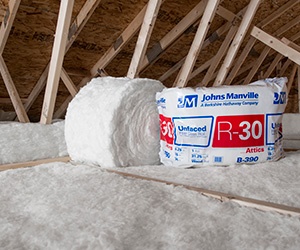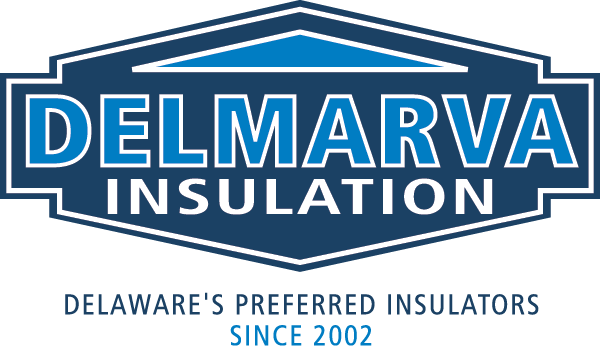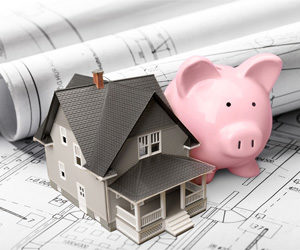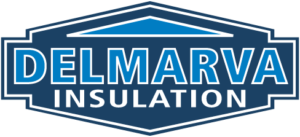Updated January 2024
 While Delaware winters are full of picturesque landscapes, frosty temperatures, and seasonal snowstorms, many Delaware homeowners also find them full of exorbitant heating bills. The key to combating this seasonal challenge? Insulation.
While Delaware winters are full of picturesque landscapes, frosty temperatures, and seasonal snowstorms, many Delaware homeowners also find them full of exorbitant heating bills. The key to combating this seasonal challenge? Insulation.
Most Delaware homeowners are missing out on the benefits that properly insulating their home can bring. Are you one of them? Insulation is the key to home comfort throughout the winter and every season of the year and works as a thermal barrier to keep warm air in and cold drafts out of your home. It’s a cost-effective upgrade that not only keeps your home comfortable but your energy bills low. In fact, according to the Department of Energy, with adequate insulation for your home, you can save up to 20% on your heating and cooling costs.
Factors That Determine How Much Insulation You Need
So, how do you know if your house has enough insulation? That’s a great question. To determine the optimal insulation for your home, several factors come into play: where you live, what type of insulation you use, and where you plan to install it. Delaware falls into climate zone 4, characterized by its cold winters, and requires a higher level of insulation than warmer climates in other zones to combat the winter chill effectively.
The type of insulation material you choose to use also plays a role. Every insulation type, whether it’s traditional fiberglass batt insulation, eco-friendly mineral wool, or efficient spray foam offers different benefits and differing amounts of each type are required to reach the correct level of insulation needed. Also, the parts of your home being insulated—attic, walls, basement, even your pipes—impact your required insulation levels. For instance, insulation for your attic may require a higher amount than the insulation needed for your basement.
Understanding the Recommended Insulation R-values In Delaware

So, what is the minimum insulation for a house in Delaware? It depends. Each part of your home requires a different level of R-value to increase your home’s energy efficiency. For attics, the recommended R-value ranges from R-38 to R-60, while walls should be insulated with R-13 to R-21. Basements and crawl spaces typically require R-25-R30. It’s essential to note that these recommendations are for 2024, reflecting the latest standards to ensure optimal insulation. Be sure to check periodically for any changes.
Navigating the Typical Costs to Insulate Your Delaware Home
Investing in insulation pays off in the long run, but what about the upfront costs? Average insulation material and installation costs per square foot vary, with considerations for different areas of your home, the type of insulation used, and the complexity and size of the job. For example, if the average cost for attic insulation in Delaware ranged from $1.50 to $4.00 per square foot, a 1,000 square foot attic could cost anywhere from $1,500 to $4,000 to properly insulate. Remember, the true cost could be different based on the previously mentioned criteria. It’s always a good idea to consult multiple professional insulation contractors to gain a practical understanding of your potential financial commitment.
What to Expect From Your Insulation Investment Over Time: Your ROI
After considering the upfront investment needed to create a more energy efficient home, your next question might be “how much of a difference does home insulation make?” That’s an easy question to answer: a lot. The addition of insulation to your Delaware home is a game-changer in both home comfort and energy bills. Not only does insulation reduce the stress on your HVAC system, but you save money on every energy bill you receive. You’ll recoup your insulation investment and enjoy ongoing savings in the form of 13-20% annual savings on your heating and cooling costs.
Helping You Create a Snug and Efficient Home for the Weather Ahead
We’ve established that ensuring your Delaware home is properly insulated is not just a good idea; it’s a necessity for both home comfort and financial savings. Remember to consider factors such as climate zone, insulation material, and the areas of your home that need insulation. By adhering to recommended R-values and understanding the costs involved, you can make informed decisions. At Delmarva Insulation, we recommend undergoing a home energy audit to determine your specific insulation needs. Our trusted team of insulation experts will then help you determine which type of insulation is best suited to meet those needs. Contact us today to learn more about creating a snug and efficient home for both the chilly winters and humid summers ahead.



